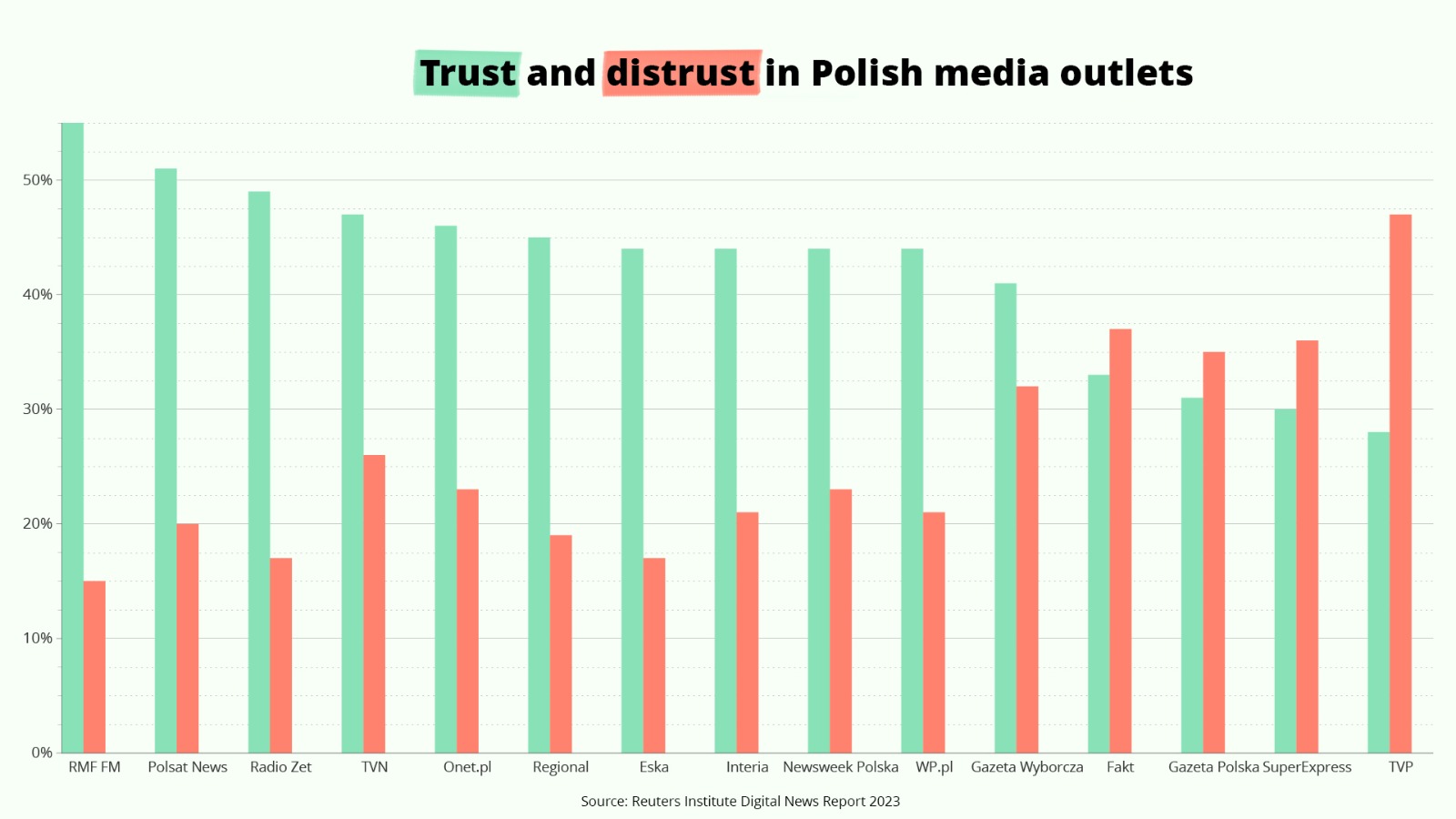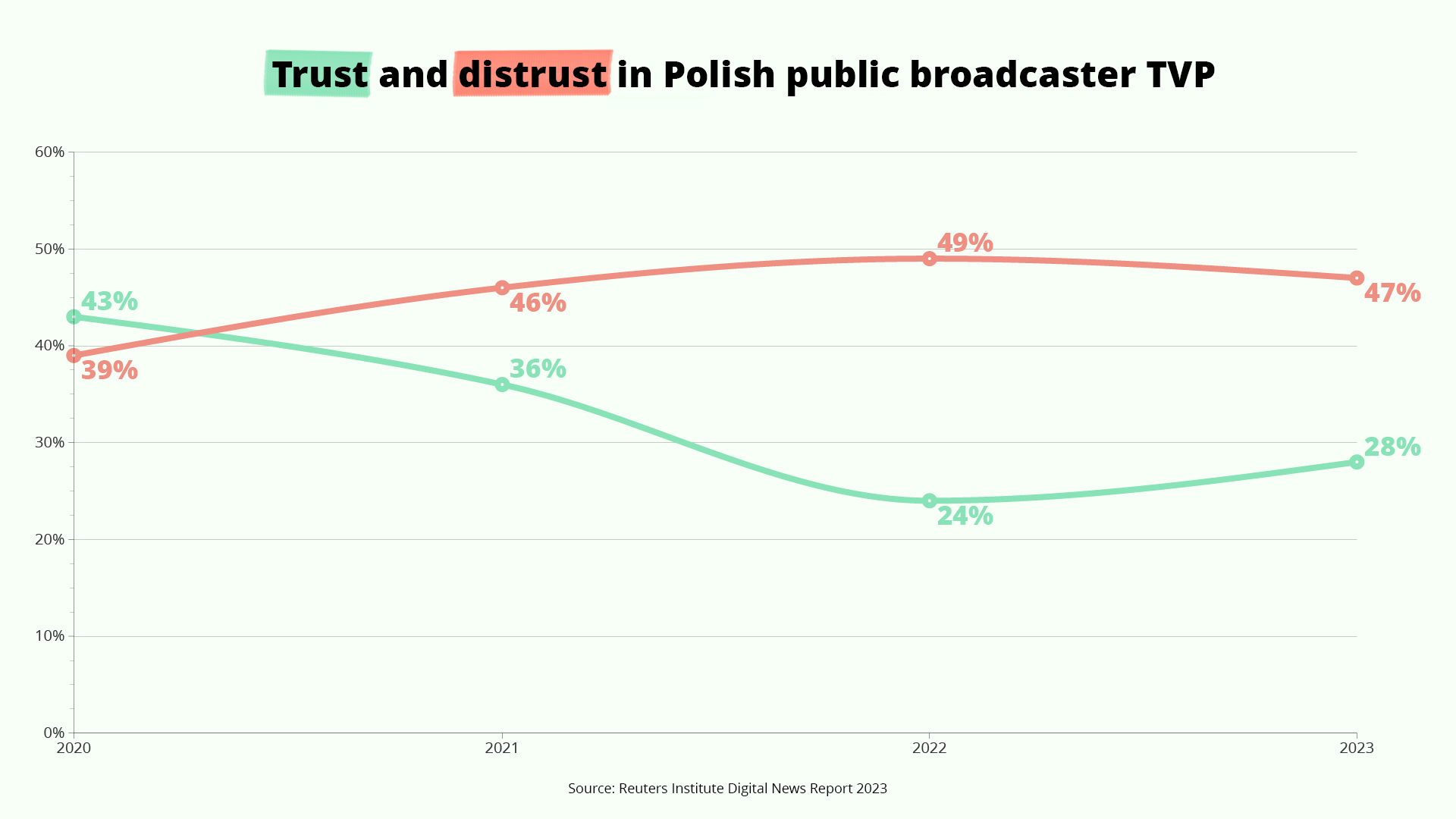Poland’s state broadcaster TVP, which has become a mouthpiece for the government, remains the country’s least trusted major source of news, an annual Oxford University study has found. Meanwhile, private radio station RMF is, like last year, the most trusted outlet.
In its latest Digital News Report, published yesterday, the Reuters Institute for the Study of Journalism at the University of Oxford conducted surveys on how news is consumed in 46 countries that together account for over half the world’s population.

It found that the proportion of Poles who say feel they can trust most news most of the time (42%) was close to the global average (40%). Poland’s figure was also by far the highest among the six countries categorised as being in eastern Europe, with Romania (32%) in second and Hungary (25%) last.
However, as elsewhere, Poles’ trust in the news has fallen in recent years. It is down 14 percentage points from 56% in 2015, the first year for which data are available.
Poland also had the fourth highest proportion of people (44%) who say they sometimes or often actively try to avoid the news. That was behind only Greece, Bulgaria (both 57%) and Argentina (46%). The total for all countries surveyed was 36%, with the lowest figures in Japan (11%), Taiwan (17%) and Denmark (19%).
Negative attitudes towards Poland’s public broadcaster TVP have risen to their highest ever level, and outweigh positive attitudes for the first time.
TVP has in recent years been used as a mouthpiece by the government https://t.co/n6dAtTx4G6
— Notes from Poland 🇵🇱 (@notesfrompoland) May 12, 2021
When it comes to individual news outlets, the most trusted among Poles was RMF, which is also the country’s biggest radio station in terms of audience share, according to figures for 2022. It is trusted by 55% of those who have heard of it and not trusted by 15%, found the Reuters Institute.
In second place was Polsat (51% trust, 20% distrust), a large private television network, followed by Radio Zet (49% trust, 17%) and another major private TV network, TVN (47% trust, 26% distrust).
At the other end of the scale, public broadcaster TVP (28% trust, 47% distrust) was the least trusted among the 15 Polish outlets included in the survey. Trust in the station has fallen from 43% in 2020, the first year for which comparable data are available, and distrust has risen from 39% since then.
TVP was followed by Gazeta Polska (31% trust, 35% distrust), a conservative daily supportive of the ruling Law and Justice Party, and two tabloids: Super Express (30% trust, 36% distrust) and Fakt (33% trust, 37% distrust), which are Poland’s two biggest-selling newspapers.

Since PiS came to power in 2015, it has brought TVP under its influence, using news broadcasts to praise the government and attack its opponents. State pollster CBOS has found that negative attitudes towards TVP rose rapidly after 2015, and by 2021 had overtaken positive ones for the first time.
In its country report on Poland – which was written by a journalist associated with Gazeta Wyborcza, a leading liberal daily that is critical of the government – the Reuters Institute noted that “TVP is widely criticised for its skewed, pro-government news coverage”.
It also highlighted efforts last year by the government to “undercut [TVP’s] competitors’ reach” during Poland’s digital switchover, as well as the channelling of advertising money from state-controlled entities towards media outlets friendly towards the government.
Five of the 15 members of state broadcaster TVP’s oversight board have called for the broadcasting regulator to take action against the station for its coverage of Sunday’s anti-government protests, which they say was “extremely unreliable and biased” https://t.co/FZtrOdXXjX
— Notes from Poland 🇵🇱 (@notesfrompoland) June 6, 2023
Main image credit: Maciek Jazwiecki / Agencja Wyborcza.pl

Daniel Tilles is editor-in-chief of Notes from Poland. He has written on Polish affairs for a wide range of publications, including Foreign Policy, POLITICO Europe, EUobserver and Dziennik Gazeta Prawna.




















